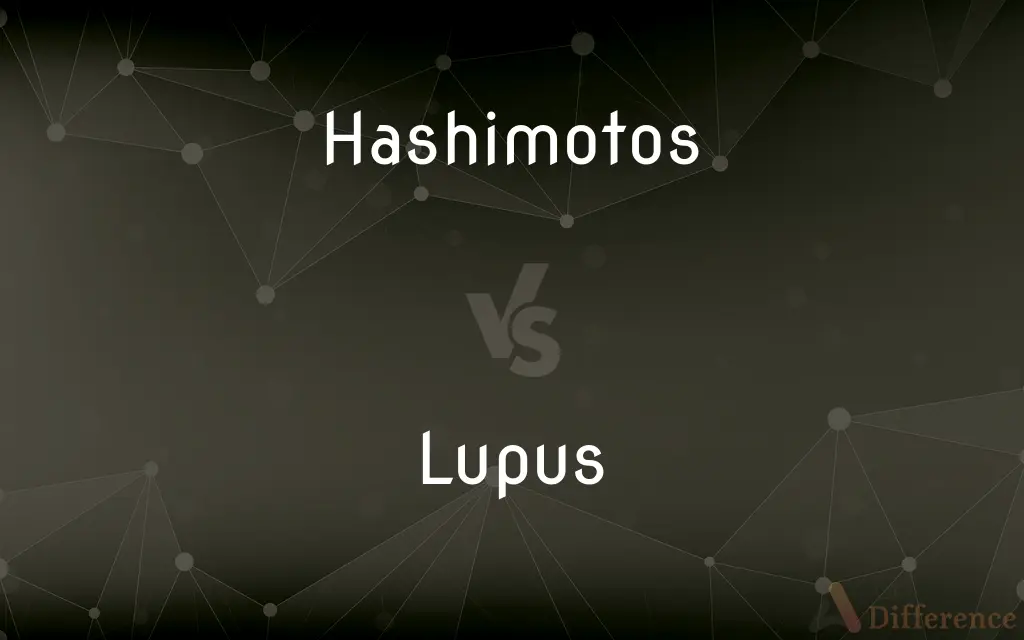Hashimotos vs. Lupus — What's the Difference?
By Tayyaba Rehman — Published on January 23, 2024
Hashimoto's is an autoimmune disorder affecting the thyroid gland, leading to hypothyroidism. Lupus is a systemic autoimmune disease that can affect various parts of the body, including joints, skin, and organs.

Difference Between Hashimotos and Lupus
Table of Contents
ADVERTISEMENT
Key Differences
Hashimoto's, also known as Hashimoto's thyroiditis, specifically targets the thyroid gland, causing chronic inflammation and often leading to an underactive thyroid (hypothyroidism). Lupus, or systemic lupus erythematosus (SLE), is a more generalized autoimmune condition that can impact many different body systems, including the skin, joints, kidneys, brain, and other organs.
Hashimoto's primarily affects thyroid function, leading to symptoms like fatigue, weight gain, cold intolerance, and depression. Lupus symptoms are more diverse and can include joint pain, skin rashes, fatigue, kidney problems, and fever. Lupus symptoms can also be more severe and systemic compared to Hashimoto's.
The cause of Hashimoto's involves the immune system attacking thyroid cells, gradually reducing thyroid function. In Lupus, the immune system attacks various tissues in the body, leading to widespread inflammation and damage.
Treatment for Hashimoto's usually involves thyroid hormone replacement therapy to manage hypothyroidism. Lupus treatment is more complex and may include anti-inflammatory drugs, immunosuppressants, and lifestyle modifications to manage its systemic effects.
Hashimoto's is typically diagnosed through thyroid function tests and antibody tests. Lupus diagnosis can be more challenging due to its varied symptoms and may require a combination of blood tests, imaging, and clinical evaluation.
ADVERTISEMENT
Comparison Chart
Target Area
Thyroid gland
Various body systems
Common Symptoms
Fatigue, weight gain, cold intolerance
Joint pain, rashes, kidney problems
Cause
Immune system attacking thyroid cells
Immune system attacking various tissues
Treatment
Thyroid hormone replacement therapy
Anti-inflammatories, immunosuppressants
Diagnosis
Thyroid function tests, antibody tests
Blood tests, imaging, clinical evaluation
Compare with Definitions
Hashimotos
Leads to hypothyroidism.
Hashimoto's has caused her thyroid to become underactive.
Lupus
A systemic autoimmune disease.
Lupus can affect multiple organs in the body.
Hashimotos
Characterized by chronic thyroid inflammation.
Chronic inflammation in her thyroid indicated Hashimoto's disease.
Lupus
Can cause joint pain and skin rashes.
Her lupus presents with a characteristic butterfly rash.
Hashimotos
An autoimmune thyroid disorder.
She was diagnosed with Hashimoto's after experiencing fatigue and weight gain.
Lupus
Treatment includes immunosuppressants and lifestyle changes.
She takes immunosuppressants to manage her lupus symptoms.
Hashimotos
Treated with thyroid hormone replacement.
She manages her Hashimoto's with daily thyroid hormone medication.
Lupus
Involves widespread inflammation.
The inflammation caused by lupus affects her kidney function.
Hashimotos
Diagnosed through specific antibody tests.
Her diagnosis of Hashimoto's was confirmed through antibody testing.
Lupus
Any of several forms of ulcerative skin disease
Lupus
Diagnosed through a combination of tests and evaluations.
Diagnosing her lupus required blood tests and a thorough clinical evaluation.
Common Curiosities
Can Hashimoto's and Lupus coexist?
Yes, it's possible for an individual to have both conditions.
Are there specific triggers for Lupus flare-ups?
Triggers can include sunlight, infections, and stress.
Is Hashimoto's more common in a particular gender?
Yes, it's more prevalent in women.
What is Lupus?
A systemic autoimmune disease that can affect various parts of the body.
Are there lifestyle changes that help with Lupus?
Yes, including regular exercise, a healthy diet, and avoiding sun exposure.
What is Hashimoto's disease?
An autoimmune disorder that damages the thyroid gland, leading to hypothyroidism.
How are Hashimoto's and Lupus diagnosed?
Hashimoto's is diagnosed through thyroid function and antibody tests, while Lupus requires a combination of blood tests, imaging, and clinical evaluation.
Can Lupus affect mental health?
Yes, Lupus can impact mental health, leading to issues like depression and anxiety.
What are the main symptoms of Hashimoto's?
Symptoms include fatigue, weight gain, and cold intolerance.
How is Lupus treated?
Treatment may involve anti-inflammatory medications, immunosuppressants, and lifestyle changes.
Can pregnancy affect either Hashimoto's or Lupus?
Yes, pregnancy can impact both, and it's essential to manage these conditions closely during pregnancy.
Does Hashimoto's lead to other health problems?
If untreated, it can lead to complications like heart problems and depression.
Can diet affect Lupus symptoms?
Diet can impact symptoms, and certain foods may need to be avoided.
Is there a cure for Hashimoto's?
There is no cure, but it can be effectively managed with medication.
Is fatigue a common symptom in both Hashimoto's and Lupus?
Yes, fatigue is common in both conditions.
Share Your Discovery

Previous Comparison
Goku vs. Vegeta
Next Comparison
Tunneled Catheter vs. Non-Tunneled CatheterAuthor Spotlight
Written by
Tayyaba RehmanTayyaba Rehman is a distinguished writer, currently serving as a primary contributor to askdifference.com. As a researcher in semantics and etymology, Tayyaba's passion for the complexity of languages and their distinctions has found a perfect home on the platform. Tayyaba delves into the intricacies of language, distinguishing between commonly confused words and phrases, thereby providing clarity for readers worldwide.












































